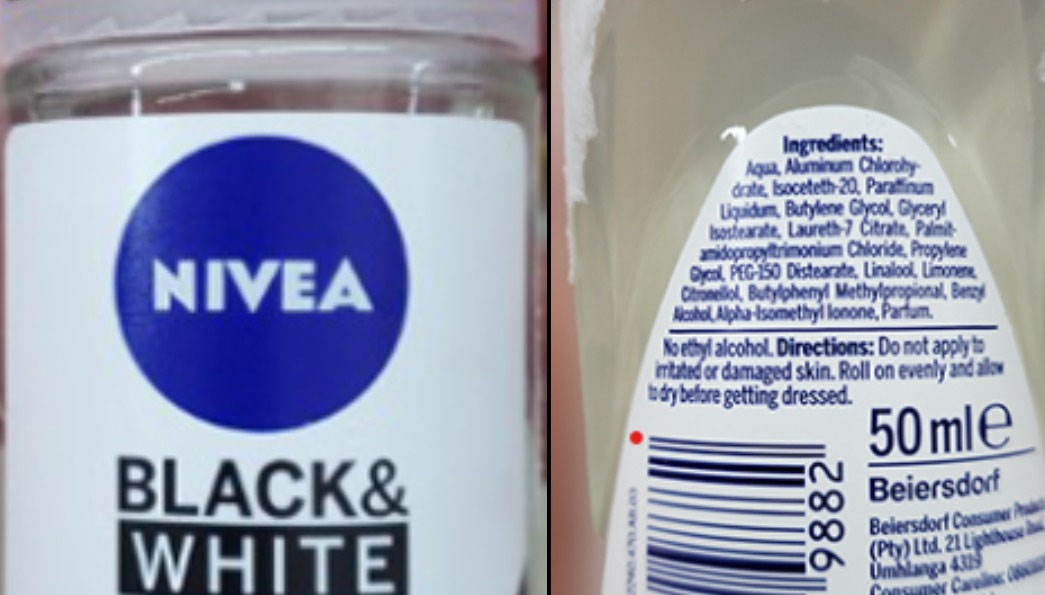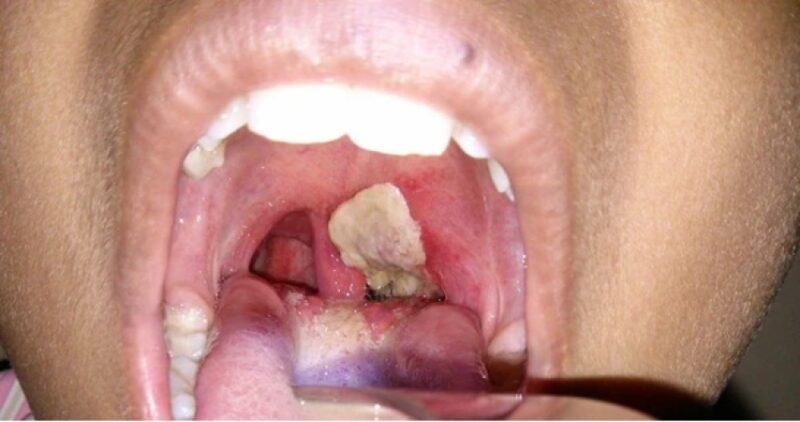Health
German company reacts to ban on Nivea brand by NAFDAC

German company reacts to ban on Nivea brand by NAFDAC
In response to Nigeria’s National Agency for Food and Drug Administration and Control (NAFDAC) banning Nivea Black & White Invisible roll-on deodorant, Beiersdorf, the German multinational company behind Nivea, clarified that this product was discontinued in 2022 and is no longer marketed or advertised in Nigeria.
NAFDAC had recently advised against the use of Nivea Black & White Invisible Body Deodorant, citing its recall in Europe due to the presence of chemicals deemed unsafe for use in cosmetics.
Beiersdorf addressed the NAFDAC advisory in a statement, highlighting that the flagged chemical, identified as 2-(4-tert-Butylbenzyl propionaldehyde (BMHCA), has been banned from cosmetic products in Europe under recent regulatory changes.
“The recalled Nivea product is said to contain 2-(4-tert-Butylbenzyl propionaldehyde (BMHCA), a chemical prohibited in cosmetics products due to its ability to cause harm to the reproductive system, impair the health of an unborn child, as well as skin irritation and burns to users,” the statement reads in part.
READ ALSO:
- Cultists kill three brothers in Anambra
- Dangote refinery says report of high petrol price false
- Most appointed heads of security agencies from North – Presidency
According to the company, the ingredient known as 2-(4-tert-Butylbenzyl propionaldehyde (LilialTM) was removed from European markets as of March 1, 2022, in line with current legislation. Beiersdorf emphasized that the specific batch NAFDAC flagged, Batch No. 93529610, was never sold in Nigeria and expired in January 2022, when it still adhered to then-valid European cosmetic standards.
“We wish to assure our esteemed customers that the Batch No. 93529610 in question has not been marketed in Nigeria and thus never recalled by Beiersdorf, the owner of NIVEA brand, as the legal manufacturer. The batch in question, in fact, expired in January 2022 and was hence at the time fully compliant with the then valid European cosmetic regulation.”
The company also reinforced its commitment to global safety standards, noting that its products undergo thorough quality checks to meet regulatory guidelines.
“Our entire NIVEA portfolio has been reformulated to exclude Lilial well ahead of the EU regulation that came into effect,” the company said.
“The NIVEA BLACK & WHITE Invisible Roll-on deodorant has been Lilial-free since at least 2020, including in Nigeria,” it added.
German company reacts to ban on Nivea brand by NAFDAC
Health
1,319 died of Diphtheria in Nigeria, says NCDC

1,319 died of Diphtheria in Nigeria, says NCDC
The Nigeria Centre for Disease Control and Prevention (NCDC) has confirmed that the ongoing diphtheria outbreak in the country has claimed 1,319 lives.
The alarming figure was disclosed in the latest situation report from the National Diphtheria Emergency Operations Centre (EOC), published on the agency’s official website.
Diphtheria, a highly contagious bacterial infection caused by Corynebacterium diphtheriae, primarily affects the mucous membranes of the throat and nose.
The bacteria produce a dangerous toxin that can cause severe complications such as breathing difficulties, heart failure, and nerve damage.
According to the NCDC, more than 42,000 suspected cases have been recorded across 37 states since 2022. The latest report covers epidemiological week 10 of 2025 and highlights ongoing challenges in controlling the outbreak, including low vaccination coverage, inadequate laboratory capacity, and delays in confirming cases,” the agency stated.
Kano State accounts for 75% of confirmed cases, with 18,108 out of 25,812 recorded in the country. Other high-burden states include Bauchi with 2,334 cases, Yobe with 2,408 cases, and Katsina with 1,501 cases.
READ ALSO:
- TUC backs NYSC member for criticising Tinubu administration
- Governors lobby Tinubu over direct allocation to LGAs
- Peace deal must bar Ukraine from Nato, Russian official says
Out of the 42,642 suspected cases reported, 25,812, or 60.5%, have been confirmed, including 396 laboratory-confirmed cases, 216 epidemiologically linked cases, and 25,200 clinically compatible cases. A total of 7,769 cases, representing 18.2%, have been discarded, while 3,591 cases, or 8.4%, remain pending classification. Another 5,470 cases, making up 12.8%, have an unknown classification.
The confirmed cases are spread across 184 Local Government Areas in 26 states. Kano, with 18,108 cases, has the highest number, followed by Bauchi with 2,334 cases, Yobe with 2,408 cases, Katsina with 1,501 cases, Borno with 1,161 cases, Jigawa with 53 cases, Plateau with 119 cases, and Kaduna with 44 cases. These states together account for 99.7% of all confirmed infections.
The NCDC reported that the overall case fatality rate stands at 5.1%, meaning that one in every 20 confirmed cases results in death. However, some states have recorded significantly higher mortality rates. Kaduna has a fatality rate of 58%, Plateau 48%, Lagos 83 per cent, and Adamawa 80%.
In the latest reporting week, 23 new suspected cases were identified, 20 in Lagos and three in Katsina. However, none have yet been confirmed, with 56.5% of cases still unclassified due to delays in laboratory testing.
To curb the outbreak, the NCDC stated that the federal government has launched reactive vaccination campaigns in high-burden states and intensified community engagement efforts, particularly through traditional and religious leaders.
The agency urged the public to ensure they are vaccinated and to seek medical attention immediately if they experience symptoms such as sore throat, fever, or difficulty breathing.
1,319 died of Diphtheria in Nigeria, says NCDC
Health
NAFDAC uncovers syndicate scamming foreign firms with fake documents

NAFDAC uncovers syndicate scamming foreign firms with fake documents
The National Agency for Food and Drug Administration and Control (NAFDAC) has uncovered a fraudulent syndicate impersonating the agency to scam foreign companies using fake documents.
The agency announced the discovery in a statement by Prof Mojisola Christianah Adeyeye FAS, its Director General, following a petition from Thani Almaeeni Trading Group, Abu Dhabi, UAE, which fell victim to the scam.
It was revealed that the syndicate is being led by one Ikoro Mang Ifendu who was arrested on February 7, 2025, in Aba, Abia State for allegedly defrauding foreign firms by posing as a NAFDAC official.
“Mr. Ikoro Mang Ifendu of 26, Park Road, Aba Abia State, born on the 2nd of January, 1973, was arrested on the 7th of February 2025 at Ogborn Hills, Aba, Abia State in a case of alleged fraud and obtaining huge funds by false pretence from unsuspecting foreigners that cuts across various countries as a NAFDAC Staff. He is a native of Amamba Village, Abiriba in Ohafia LGA, Abia State. His level of education is SSCE and he deals in clothing materials. The suspect is in our custody and is cooperating with the investigation,” the agency stated.
How the syndicate operated
NAFDAC disclosed that the syndicate used a sophisticated three-pronged scheme involving a buyer, a bank, and a lawyer. First, a buyer would contact foreign firms to purchase goods for importation into Nigeria.
READ ALSO:
- Naira strengthens, gains N29.89 against US dollar
- EL-Rufai, police clash over ex-commissioner’s arrest
- How to lower fuel consumption of your car
The company would then be introduced to a bank, where they were informed that NAFDAC approval was required for transactions. A lawyer would subsequently be introduced, claiming to facilitate NAFDAC certification for a fee. Fraudulent receipts and counterfeit NAFDAC certificates were issued to victims.
The fraudulent operation extended across multiple banks and accounts. Investigations revealed that the group managed 15 domiciliary and 5 local accounts in seven Nigerian banks, with an inflow of over $950,000 into Nigerian accounts and $450,000 into offshore accounts in Cotonou, Benin Republic. Even after Ifendu’s arrest, foreign victims continued to send money, with a recent alert of $75,000 received in one of the accounts.
Fake documents used in the scam
The documents used to deceive foreign companies included:
- A counterfeit Certificate of Registration for Dried Fish (Seafood) under the NAFDAC Registration No. A2-7059, issued to Thani Almaeeni Trading Group.
- Fake revenue receipts, including a N6,687,000 receipt dated November 28, 2024, and another N20,900,000 receipt dated December 13, 2024.
- A forged processing requirement document for $13,785, purportedly signed by a former NAFDAC director who retired a year earlier.
- Fraudulent Swift Advice copies, including a $1,990 transaction to Rosemary Obosi and a $3,000 transaction to Ifendu.
- A telegraphic transfer record showing USD 132,972.84 sent to Citycode Savings & Loans, Lagos, on December 24, 2024.
The fraudsters also used letterheads falsely to identify themselves as HALI & CO Chambers, operated by Ifendu and Obosi.
Foreign companies affected
- Aside from Thani Almaeeni Trading Group, other victims identified include
- Japan Long Tie (China) Co. Ltd, Jinan, China (importation of condoms
- BEYOND-Korea, USA
- Aquaforest SP, Poland (drinks and vegetable oil registration)
- Nomea srl, Italy
- Tianyan Filter Cloth Co. Ltd, China
- Siam Canadian China Ltd, China (frozen onion spices)
Case transferred to EFCC
Following NAFDAC’s findings, the case will be transferred to the Economic and Financial Crimes Commission (EFCC) for further investigation. The probe will extend beyond NAFDAC-regulated products to track assets acquired through fraudulent activities.
“This investigation will invoke POCA [Proceeds of Crime Act] on all the assets illegally acquired in the course of these fraudulent activities,” NAFDAC stated.
NAFDAC has warned businesses against engaging consulting firms claiming to facilitate product registrations.
The agency advised firms to verify all NAFDAC-related registrations through its official portal: https://registration.nafdac.gov.ng/
NAFDAC uncovers syndicate scamming foreign firms with fake documents
Health
Diphtheria outbreak: Lagos begins vaccination at King’s College

Diphtheria outbreak: Lagos begins vaccination at King’s College
The Lagos State Government has launched a diphtheria vaccination drive at King’s College, Victoria Island Annexe, following an outbreak of the disease.
The state health authorities have activated emergency measures to contain the spread and protect students.
In a statement by the state’s ministry of health, the Commissioner for Health, Prof. Akin Abayomi, confirmed that an Emergency Operations Committee (EOC) has been set up to contain the outbreak and prevent further spread.
“The Lagos State Government has activated its Emergency Response Committee, following the outbreak of diphtheria in the boarding house of King’s College, Victoria Island Annexe,” the statement read.
Newstrends earlier reported that parents raised alarm over the situation, questioning the school’s response and sanitation standards.
According to Abayomi, the index case was a 12-year-old student who presented with a sore throat and fever at the school clinic on February 22. He was referred to the Lagos University Teaching Hospital (LUTH), where he was diagnosed with diphtheria and treated with antibiotics and a full dose of diphtheria antitoxin serum.
“Despite the timely intervention, the boy succumbed to progressive and irreversible inflammation of the heart (myocarditis) on the 6th of March. Myocarditis is a severe and recognized complication of the bacterial infection caused by the toxin,” Abayomi said.
READ ALSO:
- I’m still in APC — Fayemi
- El-Rufai has strengthened our ranks – SDP chairman
- Amnesty seeks justice for Minna footballer shot dead by ‘drunk policemen’
He further disclosed that 34 close contacts of the deceased student were placed under observation, out of which 14 developed symptoms consistent with diphtheria.
“Of these, 14 have developed symptoms consistent with diphtheria. In response, the affected students were transported to the Children’s Emergency Unit at Lagos University Teaching Hospital (LUTH), where they were screened by health professionals,” he added.
Out of the 14 students examined, 12 were diagnosed with early signs of diphtheria and admitted for treatment. The Commissioner assured that all 14 symptomatic students are responding well to treatment, and no new cases have been recorded.
Following a preliminary inspection of King’s College Annexe, health officials identified areas needing improved infection prevention and control measures.
Consequently, the state government, in collaboration with federal health agencies, has commenced a targeted vaccination campaign for all students in both the boarding facility at Victoria Island Annexe and the primary academic campus at Igbosere Main School.
The Lagos State Government also noted that the World Health Organization (WHO), Nigeria Centre for Disease Control (NCDC), and National Primary Health Care Development Agency (NPHCDA) have been notified and are working with the Lagos State Government to coordinate an effective response.
The state is currently distributing information leaflets to healthcare facilities detailing diphtheria symptoms, prevention, and early treatment options.
A public health announcement is being prepared to sensitize Lagosians on the outbreak, urging them to watch for symptoms such as sore throat, fever, difficulty in breathing, and swollen neck glands.
Diphtheria outbreak: Lagos begins vaccination at King’s College
-

 International3 days ago
International3 days agoUK announces new passport application fees starting April 2025
-

 metro1 day ago
metro1 day ago‘We’re not hiring,’ NNPC denies viral recruitment adverts
-

 metro2 days ago
metro2 days agoMore trouble brews in Rivers as Ijaw congress considers self-determination option
-

 metro12 hours ago
metro12 hours agoNatasha: Court blocks recall attempt, stops INEC
-

 metro3 days ago
metro3 days agoCourt lifts order stopping Senate probe on Natasha Akpoti
-

 Sports12 hours ago
Sports12 hours agoOdegbami speaks on Osimhen breaking his 44-year goals record
-

 metro3 days ago
metro3 days agoMohbad’s brother, Adura, arrested by police in Lagos
-

 metro3 days ago
metro3 days agoTanker explodes on Abuja bridge, many feared dead, 30 vehicles burnt







